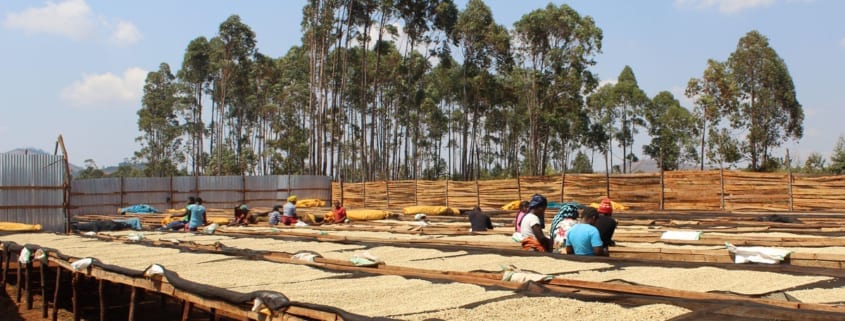In the past few days, we have discussed with a few of our customers their quality concerns for more commercial qualities such as Lekempti, Djimmah and Sidamo and the increasing stocks at a destination of low quality coffee rejected by roasters; Indeed the current crop quality is disappointing, the quality of Commercial Natural grades such as Djimmah and Lekempti 5 have been negatively impacted by the instability in Wellega region during the harvesting period in 2019; farmers were cowed into staying away from their farms by anti-government forces, cherries were not picked and fell on the ground where they dried in unattended conditions if cherries were picked from the tree, harvesting, and drying was not properly done; furthermore, there was a lot of rain during the harvest which also made cherry drying difficult; all this resulted in high proportions of mouldy beans and consequent earthy and phenolic cups.
We also believe that shippers are being less diligent in processing and preparing coffee for export and the most likely explanation for this is to minimise their loses; import businesses that run parallel to coffee export have become less profitable due to the economy decelerating over the past 12 months or so.
Southern coffee export quality (Sidamo, Guji and Yrgacheffe) is also lower than expected as low carry-in stocks, rolled over contracts from the previous season, lower production and the disruption to the normal flow of coffee caused by vertical integration have put shippers on a defensive footing this season; many shippers are increasingly turning to mix washed coffees from other regions such as Limu, Tepi with Southern coffees to meet their commitments of commercial Sidamo 2. As a consequence we are having to be very vigilant prior to shipment to ensure that what is shipped is what is contracted, which is resulting in delayed shipments and a lot of running around on the part of our colleagues in Addis.
We believe that currently shipments and registrations are below what we would normally expect as a result of the minimum price regulations (grade 5 coffees have minimum prices that equate to plus differentials FOB); with quality issues mounting, lower demand from overseas, and internal prices way above tradable levels, we can see a situation where shipments slow down to a trickle and these qualities end up being consumed in the local market or accumulate in warehouses in-country.
COVID cases continue to increase although remain at proportionally low levels when compared to other countries around the world. Disruption to the supply chain from the pandemic continues to be minimal.
by Charles Seara Cardoso





Leave a Reply
Want to join the discussion?Feel free to contribute!